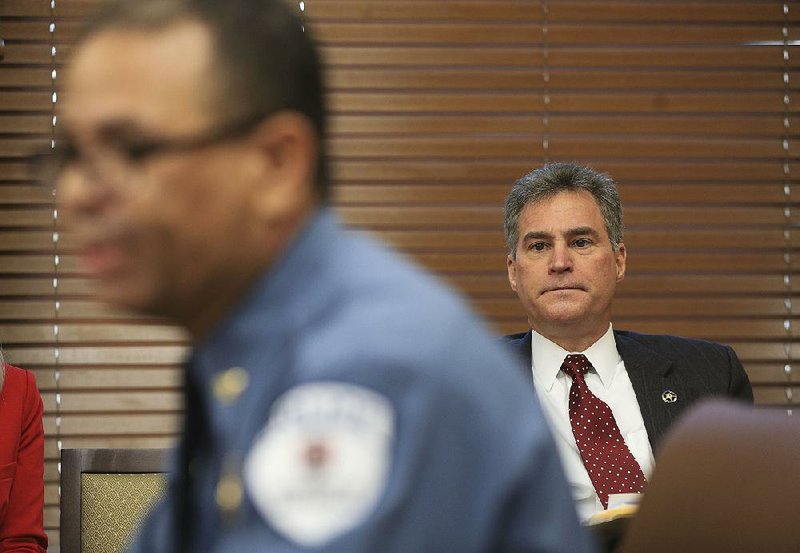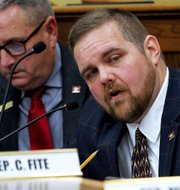Arkansas legislative leaders hope the House this week will decide which constitutional amendment proposed by a House member should be referred to voters next year.
They also plan to begin discussing the Revenue Stabilization Act, the law that distributes general revenue to state agencies in the fiscal year that starts July 1.
Also this week, the Senate Judiciary Committee is expected to consider additional changes to a House-approved bill, sponsored by Rep. Charlie Collins, R-Fayetteville, that would allow college faculty and staff members who have concealed-weapons permits to carry their guns on the campuses of public two- and four-year colleges.
The Senate voted Thursday to add to the campus-firearms bill a 16-hour training requirement, as proposed by Sen. Jeremy Hutchinson, R-Little Rock.
Gov. Asa Hutchinson, Jeremy Hutchinson and Collins said Friday that they're trying to work out a compromise on the measure, House Bill 1249. Asa Hutchinson is the uncle of Jeremy Hutchinson.
Collins said he wants his bill to be a deterrent to "bad guys" while minimizing the possibility of gun accidents on campus.
"There are different ideas being tossed around," he said. He declined to reveal them. "I am optimistic about what the outcome will be."
Today is a state holiday -- George Washington's Birthday and Daisy Gatson Bates Day. The Senate is to convene at 1:30 p.m., after taking Friday off for the holiday. The House met Friday and will take today off for the holiday.
Rep. Bob Ballinger, R-Hindsville, who is chairman of the House State Agencies and Governmental Affairs Committee, said that in the coming week, he wants the panel's Subcommittee on Constitutional Amendments to recommend four representative-proposed amendments to the full committee. Members of the House have filed 20 proposals for constitutional amendments. The subcommittee is to meet Tuesday afternoon.
Under joint rules, the House and Senate can each submit one proposed amendment for referral to voters in the next year's general election with the approval of the other chamber.
Ballinger said he would like for the House committee to recommend one of the four proposals on Wednesday, and for the House to consider the recommended proposal by the end of the week.
An amendment on voter identification is the favorite among the proposals, Ballinger said.
"If I was betting, like on a horse race, I would bet on voter ID. But it's up to the will of the committee," he said.
House Joint Resolution 1016 by Rep. Robin Lundstrum, R-Elm Springs, would mandate that the Legislature pass laws requiring absentee voters and voters at the polls to provide valid photo IDs in order to cast ballots.
In addition to Lundstrum, 37 representatives and 12 senators are co-sponsoring that proposal. The sponsors include 10 members of the 20-member House State Agencies committee and four members of the eight-member Senate State Agencies committee, which consider which amendments to recommend.
Lundstrum said she has "no idea" about the odds of her proposed amendment clearing the House committee because "there are a lot of good ones out there."
One amendment proposal was offered by House Speaker Jeremy Gillam, R-Judsonia, who initially filed House Joint Resolution 1003 as a "shell," meaning it lacked details. Gillam said he plans to amend the measure to flesh it out. Reps. Andy Mayberry, R-East End; Greg Leding, D-Fayetteville; and Ballinger are listed as co-sponsors to his resolution.
The updated proposal -- posted as Amendment No. 1 to HJR1003 on the General Assembly's website -- would change the requirement for voter approval of constitutional amendments from a majority of voters to 60 percent of voters.
"There was a lot of concern, and I heard this even leading up to November, about how easy it was for someone to just buy a constitutional amendment in Arkansas," Gillam said. "It is our constitution. It shouldn't be as easy as it is for somebody to just buy an amendment."
Among other things, the proposal would:
• Increase the vote required in the House and Senate to refer a proposed constitutional amendment to voters, from the current majority vote in each chamber to a two-thirds vote in each chamber. A majority vote in the 100-member House is 51 votes, and in the 35-member Senate it's 18 votes. A two-thirds vote is 67 votes in the House and 24 votes in the Senate.
• Increase from 15 counties to 25 the minimum number of counties from which petitions must be submitted for an initiated constitutional amendment. Also, the number of registered-voter signatures on petitions in each county would have to equal at least 5 percent of the votes cast in the county in the previous gubernatorial election. The total signatures on all petitions still would have to be at least equal to 10 percent of the votes cast in the previous gubernatorial election.
• Require proposed initiated acts and proposed constitutional amendment petitions to be filed with the secretary of state's office no later than 180 days before the election -- up from four months before the election.
• Bar a proposed constitutional amendment from bestowing powers, privileges or authority to a specific individual identified by name or a private business entity identified by name.
House members have proposed a cornucopia of other constitutional amendments, including one requiring the Legislature to meet in session for up to 60 days each year, and one allowing the Legislature to affect tuition and fees at colleges.
On Thursday, the state Senate approved a proposed constitutional amendment that would limit attorneys' contingency fees and the award of certain damages in civil lawsuits. The amendment also would grant the Legislature control over the state Supreme Court's rules. The proposal is Senate Joint Resolution 8 by Missy Irvin, R-Mountain View.
Fifty-three of the House's 100 members are co-sponsors of SJR8. If the House approves the proposal, it will be on the ballot for the November 2018 general election.
The Legislature may refer up to three constitutional amendments to voters during each regular session. A two-thirds vote in the House and the Senate is required for the chambers to even consider referring a third proposed amendment.
As for the Revenue Stabilization Act, Senate President Pro Tempore Jonathan Dismang, R-Searcy, said he expects lawmakers to begin work this week.
"We are still looking at what the impact of this current [general revenue] forecast change -- if there is going to be one -- would have on [the act] because a lot of [the proposed budget] is built on existing spending levels and, if that changes, then we may look at changing this particular RSA," Dismang said.
Gov. Hutchinson has proposed a $153 million increase in the general revenue budget in fiscal 2018 over fiscal 2017, to $5.48 billion, with most of the increase going to the state Department of Human Services.
Earlier this month, the Republican governor asked several state agencies to prepare contingency plans in case he has to cut their budgets. During the first seven months of fiscal 2017, net general revenue available to state agencies fell below the forecast by $57 million.
Gillam said he's had some conversations with Richard Wilson, assistant director of research for the Bureau of Legislative Research, since the January revenue report was released earlier this month.
Wilson has "talked to several members and said the same thing that he said to me, [that] when you look at the bigger picture, we are not at panic mode yet. It is just one of those things you need to watch and be cautious of," Gillam said.
Meanwhile, Senate Revenue and Taxation Committee Chairman Jake Files, R-Fort Smith, said he's working on compromises regarding his legislation to persuade out-of-state companies that have no physical presence in Arkansas to start collecting taxes on their sales to Arkansans and to remit that tax revenue to Arkansas' government. The legislation would require those companies that don't currently collect such sales taxes to provide annual reports to the state about Arkansans' purchases.
Earlier this month, Seattle-based Amazon announced that it will begin collecting taxes on its sales to Arkansans and remit that tax money to state government. The announcement came four days after the Senate approved Files' Senate Bill 140.
Last week, the House Revenue and Taxation Committee declined to recommend House approval of Files' bill.
House Democratic leader Michael John Gray of Augusta fell one vote short of the 11 required to approve his amendment that would have earmarked $25 million of the projected increase in sales-tax collections to efforts such as the state's pre-kindergarten programs; rural police and fire protection grants; and reducing the waiting list for services for the developmentally disabled.
Files said, "I am just trying to find something that is palatable to everybody that will get the bill out of committee, but not hurt it on the [House] floor."
The House Revenue and Taxation Committee consists of 10 Republicans and 10 Democrats. The House has 76 Republicans and 24 Democrats.
Gray said Friday night that he hadn't visited with Files regarding the legislation.
"Hopefully, I'll hear something Monday," he said.
A Section on 02/20/2017




